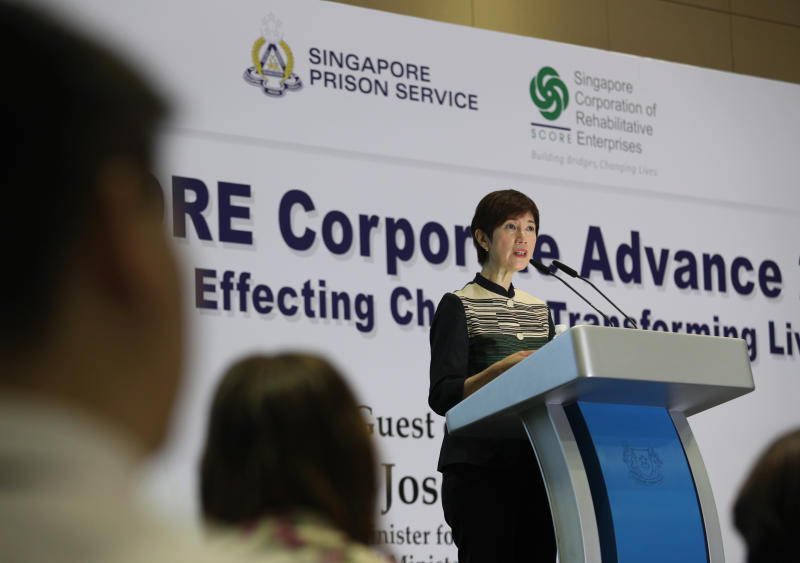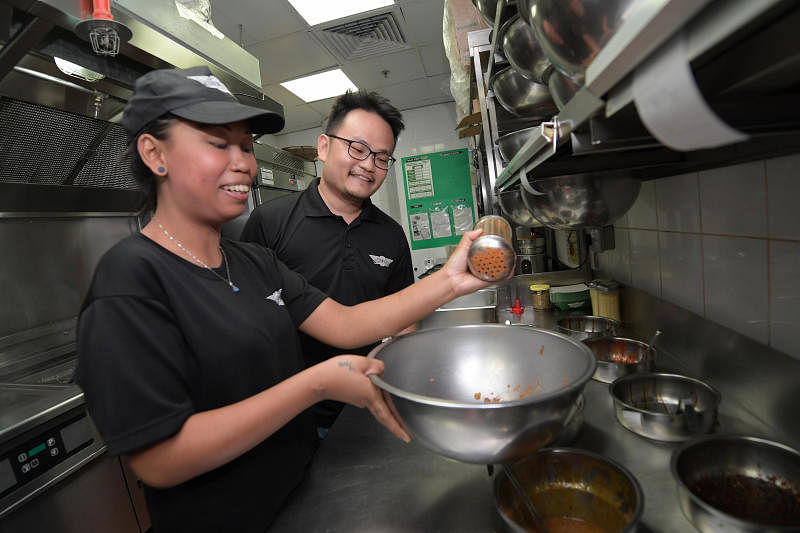Job trial, family programmes introduced to help ex-offenders reintegrate into society
Sign up now: Get ST's newsletters delivered to your inbox

Minister for Manpower and Second Minister for Home Affairs Josephine Teo speaking at SPS-SCORE Corporate Advance 2019 at Max Atria on April 26, 2019.
PHOTO: LIANHE ZAOBAO
SINGAPORE - Even before the end of her six-month sentence for drug-related offences, Ms Ramona Rahman, 28, began her job search.
With minimal prior job experience, the Secondary 3 dropout was worried that she would not be able to adapt to the fast-paced F&B industry with its long shift hours.
But with the help of a pilot programme to boost job retention for former offenders, she received assistance from her employer Wingstop Singapore and her job coach from the Singapore Corporation of Rehabilitative Enterprises (Score) to adjust to working life.
On top of a structured orientation programme to prepare her for the job, her supervisors from the fast-food chain's VivoCity outlet allowed her to work regular hours from 9am to 5pm, as Ms Ramona is a single mother of three children aged four, seven and 10.
Her story was cited by Manpower Minister and Second Minister for Home Affairs Josephine Teo at the annual Singapore Prison Service-Score Corporate Advance event on Friday (April 26).
"Her supervisors' actions and empathy towards her needs have motivated her to put in her best effort at work. So today, after more than three months on the job, Ramona is confident and able to carry out her duties independently," said Mrs Teo.
The Career Trial programme is a collaboration between Score and Workforce Singapore to improve job matching and retention for former offenders.
Since it began last November, 41 former offenders and 31 employers have taken part in the six-month pilot programme, with seven ex-offenders, including Ms Ramona, offered permanent employment at the end of their stint.

The rest are still on the programme, according to Score.
During the short-term work stint, ex-offenders have to fulfil between 16 and 480 hours of work and are paid between $7.50 and $15 per hour.
At the end of the stint, employers will assess their job suitability before offering permanent employment with a monthly salary of $1,500 or more.
Under the programme, a job retention incentive of $1,500 is also given to ex-offenders who stay on in the job for at least six months.
To help with job retention, Score assigns a job coach to each of the ex-offenders for up to 12 months after their release. These coaches work closely with them at their workplaces to provide support and advice, as well as with their employers and supervisors to resolve work-related issues.
To provide a wider range of job opportunities for ex-offenders, more employers are urged to join the programme, said Mr Huzair Hyder, Score's assistant director (placement) of the Reintegration Division.
"They have served their time and undergone relevant training to improve their employability. With self-determination, gainful employment and strong community support, they can lead crime-free lives and contribute actively to society," he added.
On Friday, Manpower Minister Teo also noted other initiatives by the Singapore Prison Service (SPS) to strengthen rehabilitation efforts for ex-offenders.
First, programmes to help offenders be active learners and take charge of their rehabilitation journey are now implemented at the start of imprisonment, instead of towards the end, she said.
This would send an "early signal" to the offender that spending time behind bars is not just about restitution, but also rehabilitation, she added.
Second, drug abusers will also be placed on community-based programmes for longer durations of up to 28 months instead of up to nine months previously.
Third, training of prison officers will be strengthened, by having the Singapore University of Social Sciences accredit the courses they undergo.
Lastly, SPS has implemented structured family programmes to encourage offenders to build stronger relationships with their families as pillars of support in their rehabilitation efforts, said Mrs Teo.
In January, two new programmes - Social Skills Training Programme and Family Reintegration Programme - were implemented across all prisons to help inmates manage family and social relationships, as well as to prepare inmates and their families for reintegration into society.
In addition, a two-year trial of the Family Interventions and Reintegration Support Team (First) was introduced last July to provide families of offenders with case managers who would then work with community partners and agencies such as the Ministry of Social and Family Development.
To date, about 60 families have participated in the trial, which will end in June next year.


